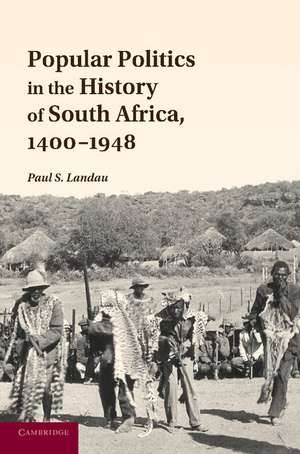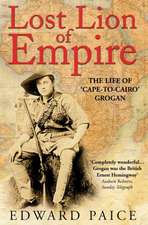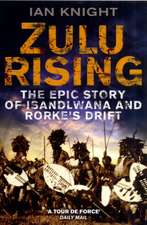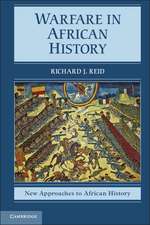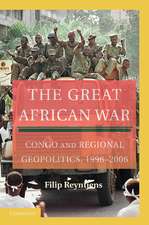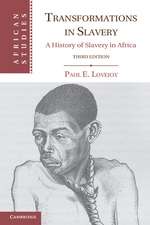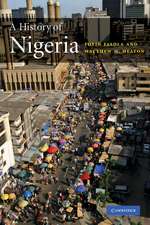Popular Politics in the History of South Africa, 1400–1948
Autor Paul S. Landauen Limba Engleză Paperback – 25 sep 2013
| Toate formatele și edițiile | Preț | Express |
|---|---|---|
| Paperback (1) | 333.30 lei 6-8 săpt. | |
| Cambridge University Press – 25 sep 2013 | 333.30 lei 6-8 săpt. | |
| Hardback (1) | 697.14 lei 6-8 săpt. | |
| Cambridge University Press – 19 sep 2010 | 697.14 lei 6-8 săpt. |
Preț: 333.30 lei
Nou
Puncte Express: 500
Preț estimativ în valută:
63.80€ • 69.32$ • 53.62£
63.80€ • 69.32$ • 53.62£
Carte tipărită la comandă
Livrare economică 21 aprilie-05 mai
Preluare comenzi: 021 569.72.76
Specificații
ISBN-13: 9781107614413
ISBN-10: 1107614414
Pagini: 318
Ilustrații: 2 b/w illus. 7 maps
Dimensiuni: 156 x 234 x 18 mm
Greutate: 0.49 kg
Editura: Cambridge University Press
Colecția Cambridge University Press
Locul publicării:New York, United States
ISBN-10: 1107614414
Pagini: 318
Ilustrații: 2 b/w illus. 7 maps
Dimensiuni: 156 x 234 x 18 mm
Greutate: 0.49 kg
Editura: Cambridge University Press
Colecția Cambridge University Press
Locul publicării:New York, United States
Cuprins
Preface: the birth of the political; 1. Eyewitness engagements; 2. History before tribes; 3. Translations; 4. The incipient order; 5. Mixed people; 6. Twentieth-century tribes.
Recenzii
'Paul Landau's masterful work opens up fresh lines of research by ambitiously narrating the history of South Africa's southern Highveld, beginning with its peopling and earliest settlements and carrying the story through to African social movements in the early twentieth century. He challenges scholars to rethink how they write the history of southern Africa.' Robert R. Edgar, Howard University
'Popular Politics in the History of South Africa, 1400–1948 is original and thought-provoking. Landau makes the important argument that the idea of entrenched ethnic identities was a product of the period of European colonialism and that a very different set of political assumptions had long animated regional politics. Landau similarly rethinks the meaning and uses of Christianity in exciting and innovative ways. Telling gripping and often moving tales, he demonstrates remarkable erudition, drawing on original sources in several languages and ranging widely in his research. This is a terrific book.' Elizabeth Elbourne, McGill University
'Paul Landau uses his linguistic genius to probe the meaning of ethnicity and tribal affiliations in South Africa. His investigation revolutionizes our understanding of the past for all of Africa south of the Zambezi. Textbooks will need rewriting, starting now.' Norman Etherington, University of Western Australia
'This is a greatly ambitious and remarkably successful book. Landau has confronted most of the challenges now facing southern African historians and proposed resolutions to them. We now see that 'tribe' and 'ethnicity' are constructs dating from no earlier than the nineteenth century. For the first time Landau asks what forms of consciousness and organization preceded them. Landau takes his stand in the Highveld, reaching out both north and south. His book will have to be taken account of by every southern Africanist.' Terence Ranger, Oxford University
'Popular Politics in the History of South Africa, 1400–1948 is original and thought-provoking. Landau makes the important argument that the idea of entrenched ethnic identities was a product of the period of European colonialism and that a very different set of political assumptions had long animated regional politics. Landau similarly rethinks the meaning and uses of Christianity in exciting and innovative ways. Telling gripping and often moving tales, he demonstrates remarkable erudition, drawing on original sources in several languages and ranging widely in his research. This is a terrific book.' Elizabeth Elbourne, McGill University
'Paul Landau uses his linguistic genius to probe the meaning of ethnicity and tribal affiliations in South Africa. His investigation revolutionizes our understanding of the past for all of Africa south of the Zambezi. Textbooks will need rewriting, starting now.' Norman Etherington, University of Western Australia
'This is a greatly ambitious and remarkably successful book. Landau has confronted most of the challenges now facing southern African historians and proposed resolutions to them. We now see that 'tribe' and 'ethnicity' are constructs dating from no earlier than the nineteenth century. For the first time Landau asks what forms of consciousness and organization preceded them. Landau takes his stand in the Highveld, reaching out both north and south. His book will have to be taken account of by every southern Africanist.' Terence Ranger, Oxford University
Notă biografică
Descriere
A history of the politics of South Africa's people from the time of their early settlements in the elevated heartlands to the dawn of apartheid.
